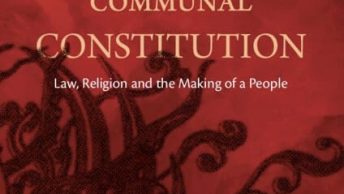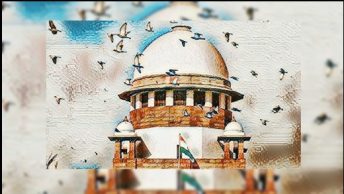(Ed Note: As part of our blog round-table book discussion on Prof. Jeff Redding’s A Secular Need: Islamic Law and State Governance in Contemporary India, this is the review by Arif A. Jamal. The introductory post and the links for the other reviews can be found here.)
Jeff Redding is to be congratulated for producing a thoughtfully argued, well-researched, and eloquently written book. Redding’s book presents a poignant animating thesis, namely that there is a dependency of Indian secular governance on non-state practitioners of Islamic law (p. 9) or as his puts it pithily “Put another way, Indian state secularism needs the Islamic non-state” (p. 4). This thesis is both carefully considered and adeptly articulated through a rich methodology drawing on Redding’s extensive field work and contextual analysis, as well as use of social theory. One can feel Redding’s intimate knowledge of the environment as well as his deep interest and concern for what is occurring. In particular, when Redding notes (p. 10) that every day violence is being directed at Muslims in India, his compassion for this community and humanity are evident.
In these brief comments, I want to discuss and respond to what I see as the framework – in particular, the framework of understanding and categorising Indian Muslims – that Redding employs and develops in the opening parts of his book. My major concern is whether too much is made of ‘Islamicness’ both in general and, in a not-meant-to-be-oxymoronic way as defining of Indian Muslims. I offer these comments as a food for thought critique, rather than criticism, of Redding’s work.
Redding notes comments by other scholars who have decried the false opposition between secularism and Islam. Redding’s take on this observation is that secular state governance can – and in the case of India does – depend on non-state Islamic legal actors. That is fair enough, but I wonder if that is the real point of observed false opposition? In other words, is the false opposition only because of the co-dependence that Redding sees in India between India’s secular state and the Islamic non-state? Perhaps the false opposition is due to deeper forces that Talal Asad has talked about in his Formations of the Secular: Christianity, Islam, Modernity, in which Asad complicates the narrative of the secular and secularism with respect to its relationship to Islam in a way that shows that one should not create simple oppositions between ‘Islam’ and the secular. Redding is of course aware of this work and Asad’s other scholarship and draws from it in his book. The point I want to make is about how I read Asad as offering a rather thoroughgoing critique of dichotomising ‘Islam’ vs ‘the secular’ not just because of co-dependence or indeed co-generation, but rather because there is more nuanced interaction and engagement in and between these categories than is generally understood. And the concern I have in the context of Redding’s book is that there is still a vein of analysis that he presents along the lines of there being an ‘Islamic tradition’ that sits in contradistinction to the ‘secular West’ as a predicate to his discussion. To be fair, this may be a matter of conviction on Redding’s part and perhaps it is also born out for him by his fieldwork in which Indian Muslims do see themselves as sitting opposed to a (Western) secular. But I’m not sure. I’m not sure that we even need to talk about things like ‘Islamic secularism’. If Muslims are secular minded or in favour of some aspects of the organisation of social or political or legal life in a way that is secular, do these conceptions of preferences need the ‘Islamic’ adjective?
Redding does go on to argue (pp. 15, 18) that there, Indian secularism has been Hindu-ised, deliberately. In this formulation, Hinduism is presented as capacious, against which Islam is presented as rigid, inflexible, intolerant and non-pluralistic (p. 21). The characterisation resonates with John Rawls in his The Law of Peoples and his thought experiment of Kazanistan in which the Muslims there could be at best decent, non-liberals, or with what Redding cites of Charles Taylor’s Multiculturalism and the Politics of Recognition (pp. 17-18). In contrast, to these portrayals of Islam, the West has adopted and developed new principles and, as Redding notes, the argument presented by some in India is that the Hindu tradition has also done so because it has always been so absorptive.
It is not too difficult to show that Islamicate (to follow Marshall Hodgson’s terminology) societies have been rather receptive and pluralistic in many respects. They have been influenced by Roman and other legal traditions, by Sassanian administrative and governance ideas, by Greek philosophy and Aristotle, by a whole host of architectural vocabularies and styles, and they absorbed and developed sciences such as medicine, mathematics and optics. In fact, this working together with other traditions is reflected in the quote from Madani cited on p. 36 of Reddng’s book and the discussion in the text immediately thereafter.
So, if the simplified characterisations of Islam seem too stylised (and they do to me and I think to Redding too), then should we also not resist over emphasising Islamic-ness as the both the other to the Indian secular state as well as, and more importantly, as defining the identity and outlook of India’s Muslims? In short, does Redding over Muslimise Indian Muslims? How much do they have to be viewed and seem only the religious adherence? For example, for the well-known, Indian singing group Salim Sulaiman, should they be seen as Muslims? Ismailis? Or just Indians? More generally, then, in making Islam the foil for the ‘secular state’ in India do we run the risk of overemphasizing the Muslimness of Indian Muslims? And is that precisely what those who want to make Indian Muslims the internal Other want? Concurrently, are Indian Muslims made to make their religious commitment their primary identity as opposed to other aspects of their personalities – singers, cricket fans, etc?






Thanks for sharing. I read many of your blog posts, cool, your blog is very good.